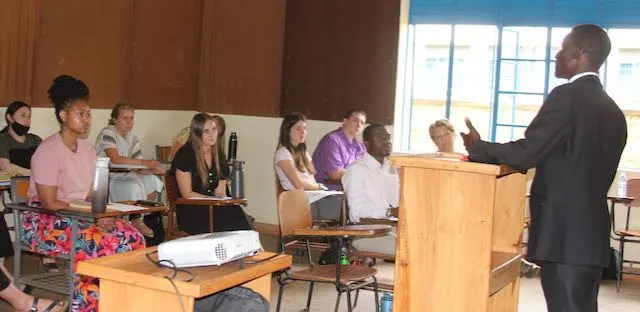By Olum Douglas
August 25, 2022, is one extra-ordinary day I shall live to remember. Waking up that Thursday morning, I had a list of activities. From checking on my parents back home in the north via phone, to taking my children to school for a requisite government data collection registration activity, to an online job interview but foremost, an opportunity to share my story with a group of American students.
The Uganda Studies Program (USP) at Uganda Christian University (UCU) had invited me to speak about my child abduction to a 16-member group of students from North America.

In attendance besides the students were USP staff and my good friend, Patricia Huston-Holm, who I insisted attend the session because I needed a shoulder to lean on in case I broke down. It was my first time to speak the story before an audience.
When I first set out to write down my story in 2011, I spent about two hours trying to fill a page on a shorthand book. The painful memories of the brutality, torture, murder and untold suffering weighed so heavily on me, causing me to weep endlessly.
I was putting words on paper for a Creative Writing course as part of the requirements for the Bachelor of Arts in Mass Communication degree I was pursuing at UCU.
After the 25-page narrative compiled under the title, “No more tears to cry,” I gathered the courage to tell the whole story of what happened to me in my native village of Gulu in northern Uganda. This narrative later became a book titled: “The Captive: My 204 days with the LRA rebels.” The book was published on Amazon in December 2020.
The days, weeks and months of writing were never a smooth sail. Many times, I was drenched in tears and unable to continue writing because the memories of some moments were so refreshed and painful.

On that sunny August 2022 day, I narrated to the students how I was abducted alongside several other children and adults on the night of April 4, 1998, by the Joseph Kony-led Lord’s Resistance Army (LRA) rebels. I was 11 years old at the time.
I told them how some of my colleagues were tortured and killed while I watched, and how we were forced to do many despicable things. As I spoke, I could see some members of the audience occasionally wipe tears.
Unlike the days I was compiling the story, I stood strong during the presentation and never shed a tear. I told the students that I have now overcome the pain.
It was an honor to be granted the platform to address the students because they are future leaders who may change the trajectory on global peace if they are helped to access the right knowledge and understand the impact of war on local communities, especially in Africa, which is a battleground for ideologies.
Personally, such opportunities help me to self-check whether I am still emotionally attached to the past. As most writers will tell you, getting something out like this is therapeutic. One of the key outcomes of authoring that book is that it helped me discharge much of the pain. And any opportunity to talk about it helps me discharge even further.
During the August session, the students were curious to know whether I take time to reflect and ask myself why that happened to me. They also asked whether all my colleagues have returned home, and what caused the about 20 years of insurgency in northern Uganda.
I answered as best as I could, knowing that later, they would have more questions as I still do.
I am thankful to Rachel Robinson, the USP director, and the entire team for stretching non-Ugandan students to learn and understand my culture, including the painful parts. I also thank my friend and mentor, Patty, for her continuous support along this journey I know I am still on. Overcoming such experiences is not easy, but I am winning.
+++
Olum Douglas lives in Mukono, Uganda with his wife and two children. Through the UCU School of Journalism, Media and Communication, he is finishing his master’s degree in strategic communication at UCU.


